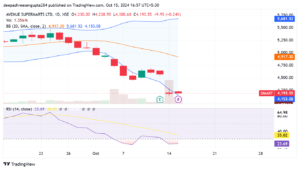DMart, operated by Avenue Supermarts Ltd, follows a fully owned and managed retail model. This strategy grants the company complete control over its operations, differentiating it from competitors that rely on a rental model. DMart secures long-term lease arrangements, usually exceeding 30 years, and owns many of the buildings it operates from. This strategy minimizes recurring rental expenses, providing cost predictability and operational flexibility over time.
The company uses a cluster-based expansion approach, focusing on high-density residential areas with a target demographic comprising lower-middle, middle, and aspiring upper-middle class consumers. By clustering stores in adjacent areas, DMart ensures efficient supply chains and optimized inventory management. This network design allows the company to reduce logistics costs and maintain consistent product availability across stores.
The foundation of DMart’s operations lies in its distribution and packing centers. These centers act as logistical hubs, facilitating a smooth flow of products from suppliers to retail stores. DMart’s emphasis on direct sourcing from manufacturers and bulk procurement ensures cost savings, further supporting its discount-driven retail strategy.
Financial Performance Overview
While DMart’s long-term growth remains impressive, recent performance has shown signs of short-term volatility. Over the past month, the stock value declined by 19.2%, reflecting changing market conditions or investor sentiment. However, the five-year performance tells a different story, with the stock delivering a 129.4% return, demonstrating resilience and sustainable growth.
Below is a breakdown of DMart’s stock performance:
- 1 Day: ▲0.2%
- 1 Week: ▼7.7%
- 1 Month: ▼19.2%
- 6 Months: ▼12.0%
- 1 Year: ▲6.5%
- 2 Years: ▼2.6%
- 5 Years: ▲129.4%
DMart boasts a market capitalization of ₹2,72,475 crore, categorizing it as a large-cap company. Its enterprise value (EV) stands at ₹2,71,991 crore, reflecting a stable capital structure. These numbers underscore the company’s dominance in the retail sector, but also highlight the importance of sustained operational excellence amid a competitive market.
Revenue Segmentation
DMart derives most of its revenue from the food category, contributing around 56% of total sales. Non-food categories, including fast-moving consumer goods (FMCG), contribute 20%, while general merchandise—which includes household products, apparel, and electronics—accounts for the remaining share.
Despite food being the primary revenue driver, profitability is largely derived from general merchandise, which offers higher margins. This highlights the company’s reliance on non-essential product categories to boost its bottom line. However, these categories face increasing competition from e-commerce platforms, making it critical for DMart to maintain its competitive edge in pricing and product variety.
Competition in the E-commerce Sector
In recent years, DMart has encountered stiff competition from digital platforms such as Ajio, Myntra, and Trent. These platforms attract customers through competitive pricing, broader product ranges, and convenience. The rise of e-commerce has forced DMart to adapt its strategy, focusing on integrating online and offline channels to create an omnichannel experience.
However, matching the agility and pricing power of pure-play online competitors presents challenges. Digital retailers can adjust prices dynamically and offer deeper discounts, while DMart must balance competitive pricing with operational costs tied to its physical store network.
Technical Analysis and Stock Insights

DMart’s stock has recently exhibited bearish signals, which may indicate short-term volatility but could also present opportunities for long-term investors.
- RSI (Relative Strength Index): The RSI has fallen below 30, placing the stock in the oversold zone, a potential indicator of undervaluation.
- Bollinger Bands: DMart’s stock closed at ₹4,183.60, crossing below the lower Bollinger Band by 2.1%—suggesting heightened volatility and potential downward momentum.
- Weekly Low Breach: The recent close was 5.67% lower than the previous week’s low of ₹4,435.00, confirming bearish momentum.
Additionally, volume and delivery ratios surged, with trading volume increasing 5.2 times compared to the five-day average. This suggests heightened market activity, possibly driven by institutional investors or traders responding to the stock’s decline.
Trading Strategy and Market Outlook
Given recent declines, DMart’s stock presents short-term trading opportunities, particularly for momentum traders using bearish strategies. As per Armour’s Momentum Strategy, the stock fits within One Day Bearish Strategies due to its oversold technical indicators.
Investors should also monitor the relative strength (RS) of the stock compared to broader market indices. DMart’s RS has decreased by 0.1 points over the past three days, with a current RS value of -0.21, indicating underperformance relative to market benchmarks.
Challenges and Risks
The retail industry faces several challenges, including rising input costs, changing consumer behavior, and competition from both offline and online retailers. DMart’s ownership model, while providing long-term stability, ties up capital in real estate and limits flexibility during economic downturns.
The increasing popularity of e-commerce platforms like Myntra, Ajio, and Trent adds pressure on DMart, particularly in non-food categories. In these segments, price-sensitive consumers may prefer online alternatives that offer more discounts and convenience. Additionally, fluctuating consumer sentiment based on economic conditions can impact discretionary spending, directly affecting DMart’s general merchandise segment.
Conclusion
DMart has established itself as a dominant player in India’s retail sector with a robust operational model centered on ownership and efficient supply chain management. While it continues to perform well over the long term, delivering 129.4% growth over five years, short-term challenges remain, with the stock declining 19.2% in the past month.
As the retail landscape shifts toward e-commerce, DMart must continue investing in digital strategies and refining its omnichannel approach to remain competitive. Despite these challenges, its cluster-based expansion strategy and focus on densely populated areas give it a competitive edge.
From a trading perspective, the stock’s current position in the oversold zone offers a potential buying opportunity for long-term investors. However, short-term volatility persists, requiring careful monitoring. Moving forward, DMart’s ability to integrate online and offline operations will be critical in maintaining its leadership in India’s retail space.
ALSO READ: CEAT Limited: Comprehensive Case Study




